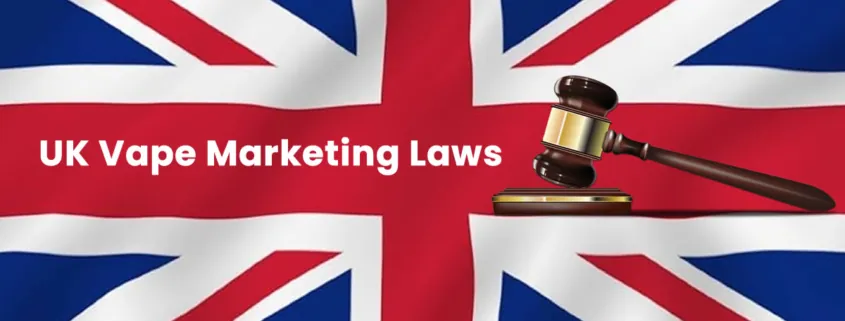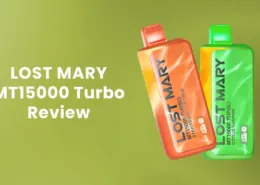UK Vape Marketing Laws: Guide for Vape Businesses
The United Kingdom has established a robust set of regulations governing the marketing and advertising of vape products. These laws, designed to protect consumers and prevent the targeting of minors, present a complex landscape that businesses must navigate carefully. At Ecigator, we understand the challenges that companies face in ensuring compliance with these regulations. In this comprehensive guide, we will explore the key aspects of UK vape marketing laws, provide practical strategies for staying compliant, and highlight common pitfalls to avoid.
Understanding the Fundamentals of UK Vape Marketing Laws
To successfully navigate the UK vape marketing landscape, businesses must have a clear understanding of the various regulations that govern advertising, packaging, and promotion. Let’s delve into the essential components of these laws.
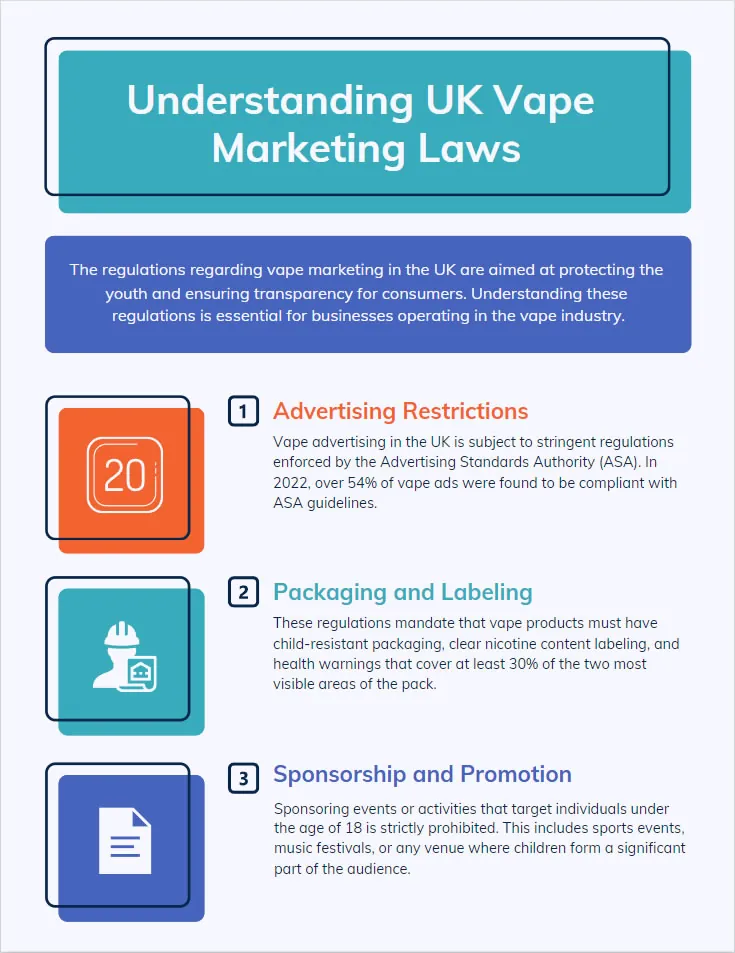
Advertising Restrictions
Vape advertising in the UK is subject to stringent regulations enforced by the Advertising Standards Authority (ASA). In 2022, over 54% of vape ads were found to be compliant with ASA guidelines, indicating that there is still significant room for improvement. One of the most critical aspects of these regulations is the prohibition of targeting individuals under the age of 18. With over 60% of youth reporting exposure to vape ads on social media platforms, businesses must take proactive measures to ensure their advertisements do not appear on platforms predominantly used by minors.
Additionally, all vape ads must include clear statements about the nicotine content of the products. Non-compliance in this area has been a frequent issue, with some ads omitting essential details. To stay within legal boundaries, businesses should prominently display warnings and health advisories on their advertisements.
Packaging and Labeling Requirements
The Tobacco and Related Products Regulations 2016 set forth specific requirements for the packaging and labeling of vape products in the UK. These regulations mandate that vape products must have child-resistant packaging, clear nicotine content labeling, and health warnings that cover at least 30% of the two most visible areas of the pack.
To ensure compliance, businesses should engage in routine audits of their packaging and consider using label templates that adhere to the regulations. It is essential to avoid packaging designs that may appeal to children, such as bright colors or child-friendly imagery. For a more in-depth understanding of these requirements, businesses can refer to the tobacco and related products regulations 2016.
Restrictions on Sponsorship and Promotion
UK vape marketing laws also impose limitations on sponsorship and promotional activities. Sponsoring events or activities that target individuals under the age of 18 is strictly prohibited. This includes sports events, music festivals, or any venue where children form a significant part of the audience.
Many brands fail to consider the full scope of these restrictions, which extend to in-store promotions as well. Signs, posters, and any promotional materials must meet the same stringent guidelines as advertisements. To ensure compliance, companies should collaborate closely with their marketing departments and provide training programs for staff involved in marketing and promotion.
By focusing on these key aspects of UK vape marketing laws, businesses can protect themselves from costly fines and avoid the pitfalls associated with non-compliance. Developing a marketing strategy that prioritizes legal compliance will position your company for long-term success in this highly regulated industry.

ECIGATOR
Ecigator is one of the well-known vape brands spun off from FM Technology Co., Ltd, it’s an ISO-certified disposable vape manufacturer for OEMs, ODMs, and OBM since 2010. The founder team comes from top firms with more than 10 years of experience in the vaping industry and has devoted thousands of hours to providing users with a better and better experience.
Implementing Effective Compliance Strategies
Staying compliant with UK vape marketing laws is essential for businesses looking to avoid penalties and build a trustworthy brand. Let’s explore some practical strategies for achieving compliance.
Knowing the Legal Requirements
The first step in maintaining compliance is to thoroughly understand the legal requirements governing vape marketing in the UK. Familiarizing yourself with regulations like the Tobacco and Related Products Regulations 2016 is not optional—it’s a necessity. This regulation provides comprehensive guidelines on advertising, packaging, and promotion.
To stay ahead of the curve, businesses should consistently update themselves on any changes in legislation. Regular training sessions can help ensure that all team members are on the same page and operating within legal boundaries.
Implementing Age Verification Systems
Age verification is a critical component of compliance in the vape industry. A 2022 study revealed that nearly 17% of vape sales to minors occurred due to inadequate age verification processes. To mitigate this risk, businesses must implement robust age verification systems for both online and offline sales.
For online sales, consider integrating age verification software that cross-references IDs or utilizes credit card data to verify age. In physical stores, train your staff to consistently request identification from younger customers. Adhering to strict age-verification protocols can dramatically reduce the likelihood of selling to minors.
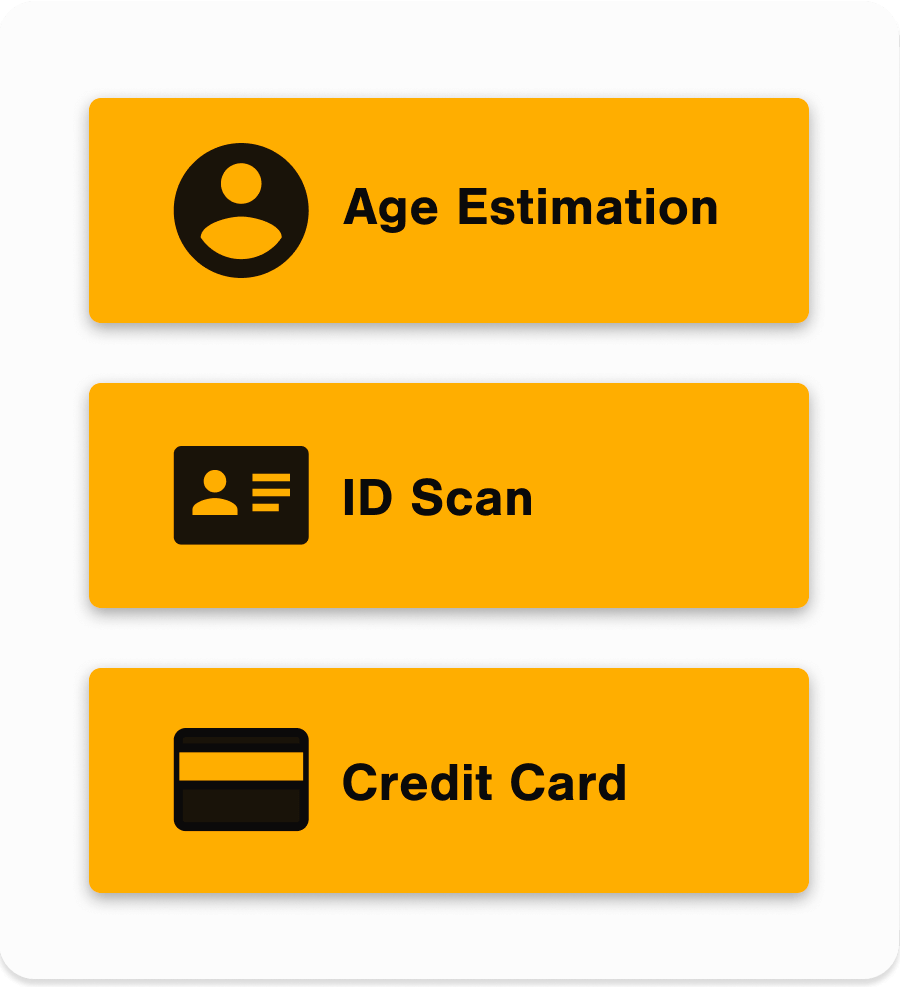
Transparent Marketing Practices
Transparency in marketing is a cornerstone of compliance in the vape industry. Clear labeling and honest advertising are essential. Any health claims made about vape products must be substantiated by scientific evidence. For example, if a product claims to aid in smoking cessation, there should be research to back up that claim.
Misleading advertisements not only erode consumer trust but also lead to penalties. Businesses should ensure that all marketing materials clearly state the nicotine content of their products to avoid legal scrutiny. For more detailed information on this topic, refer to the e-cigarette advertising rules.
By adhering to these compliance strategies, your business can safeguard itself from hefty fines and negative publicity. Following these guidelines not only keeps you legally secure but also builds a foundation of trust with your customers, which is invaluable in the competitive vape market.
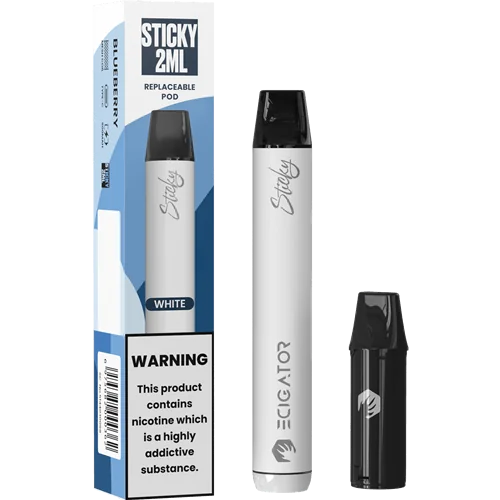
Ecigator Sticky Prefilled Pod Kit
The Ecigator Sticky Prefiiled Replaceable Vape Pod Kit is new kind of vape kit which the prefilled disposable pod can be changed.
That means you don’t need to throw away the whole kit but just change another pod. Also you can change the pods to taste different flavors.
Avoiding Common Pitfalls in Vape Marketing
Even with the best intentions, businesses can sometimes fall into common pitfalls when navigating the complex world of UK vape marketing laws. Let’s examine some of these pitfalls and discuss strategies for avoiding them.
Misleading Claims and Misbranding
Making unsupported claims about vape products can quickly land businesses in hot water. UK regulations stipulate that any health-related claims must have solid scientific backing. For example, claiming that a vape product aids in smoking cessation without reliable data to support that claim is a clear violation.
A study showed that 40% of vape users were misled by unfounded health claims. To maintain credibility and legality, always ensure that your statements are backed by verifiable research.
Inadequate Age Verification
Selling vape products to minors is not only illegal but also damaging to your brand’s reputation. In 2022, almost 17% of vape sales to minors were attributed to poor age verification systems. Retailers must employ robust checks for both online and offline sales.
For online platforms, integrating ID verification software can help block underage purchases. In physical stores, the simple act of consistently asking for identification can drastically reduce the risk of selling to minors. Failing to implement adequate age verification measures not only violates the law but also erodes consumer trust.
Non-Compliant Social Media Campaigns
Social media platforms offer powerful tools for vape marketing, but they come with their own set of stringent rules. The Advertising Standards Authority found that many vape ads on platforms like Instagram and Facebook failed to comply with age-related guidelines.
There are limits on featuring individuals who appear to be under 25 years old in ads, and promotions should not appeal to youth culture. To avoid penalties and negative publicity, configure your targeting settings to exclude users under the age of 18 and avoid youthful imagery in your campaigns. For more detailed rules and guidelines, consult the Advertising Codes through the Advertising Standards Authority.
By proactively addressing these common pitfalls, businesses in the vaping industry can more effectively navigate the complex regulatory landscape and build stronger, law-abiding brands.
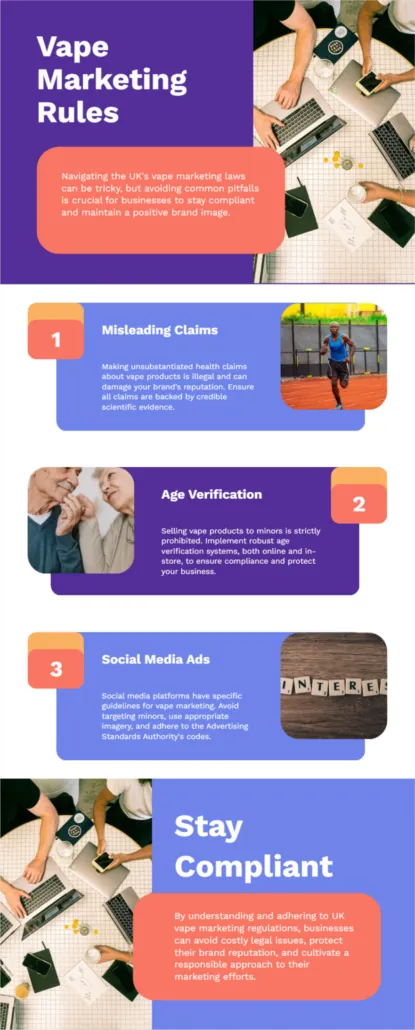
Conclusion
Understanding and adhering to UK vape marketing laws is essential for any business operating in this sector. From stringent advertising restrictions to clear packaging requirements and limits on promotion, multiple aspects require meticulous attention to detail.
Compliance not only helps businesses avoid costly penalties but also builds consumer trust, which is invaluable in the competitive vape market. By staying informed about legal requirements, implementing robust age verification systems, and maintaining transparent marketing practices, your business can navigate the complex landscape of UK vape marketing laws with confidence.
Remember, prioritizing compliance is not just about avoiding legal pitfalls—it’s about building a strong, trustworthy brand that resonates with consumers and stands the test of time.
- Austria Plans to Ban Disposable E-Cigarettes - August 5, 2025
- Vaping vs. THC Drinks: Which Cannabis Option Is Right for You? - August 4, 2025
- Colombia’s New Vape Law: A Reality Check on Enforcement - August 4, 2025

